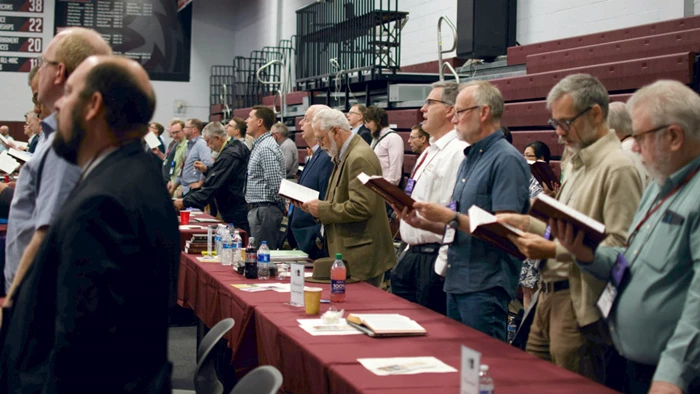The moderator at the 2022 General Assembly asked the people who made the statements to Eastern students and staff to come forward a second time on Monday morning. By Tuesday, one commissioner had come forward and personally apologized for making statements about “slave labor,” which he said was meant as a joke. Another apologized for the conflict with the staff worker. No one had claimed responsibility for saying a racial slur.

The Orthodox Presbyterian Church (OPC) announced on Wednesday that the person who uttered a racial epithet during the denomination’s General Assembly was not a delegate to the annual meeting.
Eastern University staff said they did not see the man on campus after the incident, according to the OPC, and all the commissioners to the General Assembly were present and accounted for.
The three other incidents that the OPC had characterized as “racially disparaging interactions” were deemed to be misunderstandings. One commissioner—who has not been named—was reportedly trying to make a joke about the 13th Amendment, which ended slavery in America. He confessed it was “a clumsy and misguided attempt at friendly humor” and expressed a desire to reconcile with the students who were offended.
The final incident was reportedly confusion over self-serve pizza in the cafeteria. The OPC has determined that the “interaction that was misunderstood by those present.”
An Eastern University spokesperson did not respond to a request for comment.
___________
Original post (July 14): The General Assembly of the Orthodox Presbyterian Church (OPC) apologized Friday for four racist incidents at its annual gathering.
In a statement of “sorrow and regret” passed without dissent, the General Assembly said “there is no place in the church for such conduct” and “we repudiate and condemn all sins of racism, hatred, and prejudice, as transgressions against our Holy God, who calls us to love and honor all people.”
The 126 commissioners from the Reformed denomination’s 296 congregations gathered in Philadelphia at Eastern University on Wednesday. The annual meetings do not normally involve much controversy and could even be considered boring when compared to the dramatic conflicts within the Presbyterian Church in America or Southern Baptist Convention.
The OPC commissioners came prepared to hear two amendments to the Book of Discipline, receive reports on giving and Sunday school attendance, and vote on a resolution of thanks to Richard B. Gaffin Jr., a Westminster Theological Seminary professor who is retiring from the Committee on Foreign Missions after 52 years.
On Thursday afternoon, the proceedings were interrupted by a report from moderator David Nakhla, who said the General Assembly was in danger of getting kicked off the Eastern University campus for violating its contract and not respecting the Christian school’s policy on racism. One person attending the General Assembly had made multiple comments about “slave labor” to students of color who were working at the school, another had gotten into an argument with a staff member, and a third had used a racial epithet.
Peter Bringe, an OPC minister and General Assembly commissioner, told CT it was painful to hear.
“The initial announcement of the moderator left the assembly in shocked silence,” he said in an email, “and we used that time until dinner to let the situation sink in and pray.”
The Eastern staff did not identify the people who made the racist comments, and there was some confusion among the commissioners whether it was one person or multiple people. The moderator, who declined to speak to CT for this story, said in an official statement that it was “multiple people.” At the General Assembly on Thursday, he asked them to come forward, but no one did.
“There was a hush over the whole body,” said Darryl G. Hart, a religious historian and OPC elder at the General Assembly. “People were sort of frozen in place and people were praying quietly. The overwhelming response was horror, shame, and contriteness.”
The rest of the afternoon sessions were suspended, according to the General Assembly minutes posted online. The moderator “requested that the commissioners commit themselves to a season of prayer.”
The next morning, after singing the hymn “Immortal, Invisible, God Only Wise” and listening to several speakers talk about missions, the General Assembly was presented with a two-paragraph statement apologizing for the “racial disparagement reported being made by some present at our Assembly” and condemning racism more generally.
Commissioners were told that if Eastern did not accept the statement, the school was within its rights to force the General Assembly off the campus for violation of its contract. If that happened, the OPC would have to suspend the meeting three days before it was finished. The commissioners approved the statement apologizing for “egregiously offensive behavior” “without dissent,” and it was released on Facebook and Twitter.
Online, the statement received sharp criticism from conservatives who said the OPC should have stood firm and refused to apologize.
“What happened?” one wrote. “Was someone seen wearing a Machen shirt?”—referring to J. Gresham Machen, a key founder of the OPC, who once objected to a plan to treat Black people as equals at Westminster Seminary.
“What a joke. OPC cucked,” wrote another man who described himself as Reformed and “100% American,” a Ku Klux Klan slogan popular in the 1920s.
Other conservatives expressed concern that the General Assembly did not investigate Eastern’s claims but just accepted that the racist incidents happened. Some speculated Eastern, a school with a tradition of encouraging evangelicals to care about social justice issues, might have made up the allegations.
One person complained the OPC had been “owned by modern culture” while another said the statement of sorrow and regret, without a full investigation, was “a good reason, if you are currently in the OPC, to consider leaving.”
Critics of the OPC, on the other hand, saw the reports of offensive comments at the General Assembly as a symptom of the deeper problem with racism in the Reformed denomination. They also argued the statement was too hazy on the details and the confession too general to count as a contrite apology.
There’s a reason racism “keeps coming up” in the OPC, said David Wallace, who helped plant an OPC church in Idaho but left in a dispute with leadership when they didn’t discipline a member who called mixed-race babies “monsters” and wrote online articles arguing for the Christian basis of ethno-nationalism.
“As a large body, they’ll say ‘sorry,’” Wallace told CT. “And then they can point to those statements to say, ‘We’ve already dealt with it. We have nothing to add.’ But racists feel very comfortable going to the OPC. The elders aren’t going to correct you.”
The Generally Assembly condemned racism formally in 1974. The committee report, approved that year, said the OPC had betrayed the calling of the gospel by accepting racial segregation and elders needed to do more to discipline racists in their congregations.
“If a member of the church proves to be unrepentant for involvement in sinful racial or social practices, church discipline should be applied in the hope that repentance unto life might be forthcoming,” the report said. “The elders are responsible to Christ to be concerned with these questions as they relate to every member.”
The moderator at the 2022 General Assembly asked the people who made the statements to Eastern students and staff to come forward a second time on Monday morning.
By Tuesday, one commissioner had come forward and personally apologized for making statements about “slave labor,” which he said was meant as a joke. Another apologized for the conflict with the staff worker. No one had claimed responsibility for saying a racial slur.
Hart, for his part, said he thought the General Assemblies response was good evidence the OPC is not racist.
“There wasn’t anyone saying, ‘This person was right,’” he said. “There was no dissent. There was overwhelming condemnation of racism. And I’m pretty sensitive to concerns about being ‘woke’ and I don’t think this was woke. I think
condemning these statements was standard in the church and standard in the United States.”
Officials at Eastern University did not respond to requests for comment, but told OPC commissioners the school accepted the apology and “consider the matter closed unless another incident occurs.”
The General Assembly continued its business and concluded the 88th annual meeting at noon on Tuesday.




